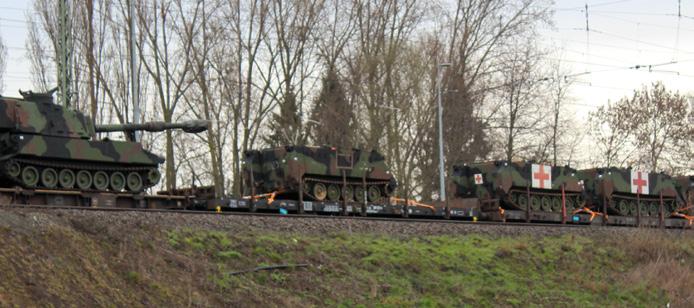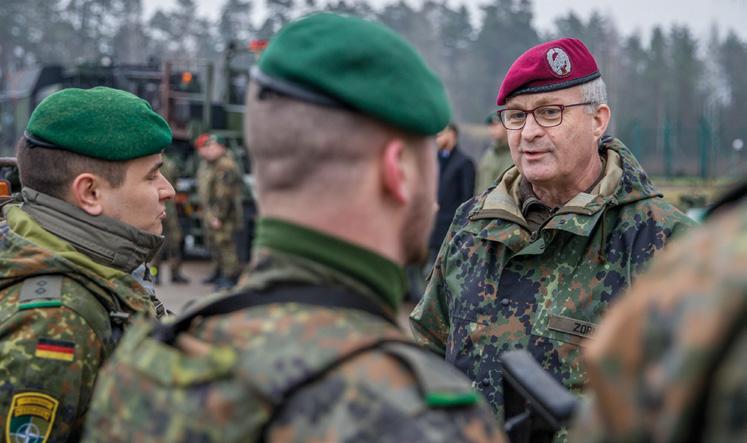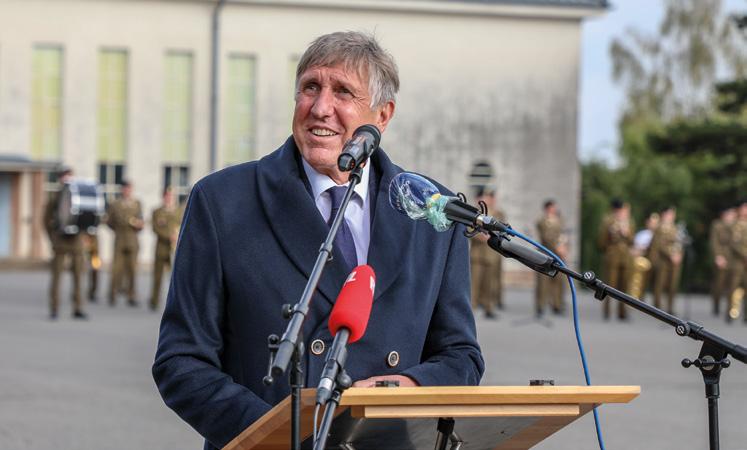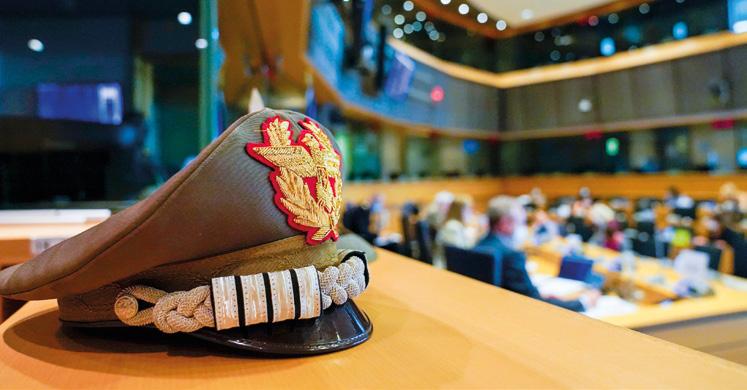
9 minute read
Nicola Beer MEP, Strasbourg/Brussels Is the German presidency succeeding to consolidate the Union and reinforce the European institutions? A critical view from the European Parliament
In the Spotlight +++ EU Presidency +++
A critical view from the European Parliament Is the German presidency succeeding to consolidate the Union and reinforce the European institutions?
by Nicola Beer MEP, Vice-President of the European Parliament, Strasbourg/Brussels
Big plans lie ahead. They set the EU’s direction for the next six months. As a German pacemaker on the European stage, they create a stronger, united Europe. The German Council presidency started with great expectations to fulfil its six-month mandate. The pandemic made this a historic challenge and Germany missed the chance to give the EU a kickstart for the development of a broader and strong vision of Europe’s future. Covid-19 overshadows the agenda Politics gained a completely different dimension. The need to make decisions of enormous importance within a truly short time and on the basis of limited data became one of the most challenging political stunts for decision makers and hence for the German presidency. Agreed. Taking stock, we should consider the coronavirus. Anything else would be dishonest. However, presidential political work is not to be assessed exclusively under the pandemic angle. The EU had a lot on its plate: adopting the EU budget with success; anchoring the recovery plan in the multiannual financial framework; finding a way to common migration politics; providing the conference for tious mandate. According to that benchmark, Europe should have become more resilient, terms of foreign policy, economically outstanding, setting the ground for a Europe of innovators. The pandemic has plunged Europe into one of the greatest existential crises since the end of World War II. The danger of erosion is alarming, but the base problem occurred before: the lack of a common vision for the future and for the reforms of EU institutions, its competences and working procedures. For years, the EU has lacked a coherent common policy for
asylum and migration including an effective protection of EU borders. The EU Commission presented a new proposal for
asylum and border protection. Unfortunately, the budget the presidency proposed for the framework of the next seven years cuts Frontex’s money to do so. Typical for the presidency:
contradictory, without political ambition and vision. Solidarity – towards a debt union? The EU reached an agreement to quickly support the programmes for short-time working, for health systems and credits for Member States, as well investments of the European Investment Bank to save societies and economies from
the future of Europe with an ambimore capable of action, upgraded in collapse and even, under the German presidency, a € 750bn
Nicola Beer MEP is a member and a vice-president of the European Parliament. She is also the federal vice-chair of the Free Democrats (FDP). From 2017 to 2019 she was a member of the German Bundestag and from 2013 to 2019 she was general secretary of her party. Prior to that, Nicola Beer was a member of the Hesse Landtag. From 2012 to 2014, she was minister of education and the arts in Hesse and from 2009 to 2012 state secretary for European affairs in the Hesse ministry of justice, integration and European affairs. aid package in order to manage recovery after the crisis. Rightly so. One should call it a success that EU Member States succeeded in setting up this historic aid programme, but it has not been without new lines of conflict: the south
of Europe celebrated Germany for having “finally” given up resistance to common debt, while some EU states from the north were stigmatised as the so called “frugal four”. Beyond this, an essential debate came up: to take on common debt or not. Let us be frank: the coronavirus aids are supposed to be measures
photo: Laurence Chaperon
of emergency. Now, a few months later, abuse is looming. Some voices are already talking about a steady aid programme. That would be tantamount to creating a debt union and the presidency would have been involved in taking that wrong path.
Foreign policy – still disappointing
In foreign policy, the expectation was not less great. The German presidency wanted to make the EU stronger together. More relevant in terms of foreign policy. The president of the EU- Commission Ursula von der Leyen set the tone: the EU should become a geopolitical union. But a geopolitical union means being a player and not being driven. Germany failed to take a tougher stance on China. While its aggressive policy towards the opposition in Hong Kong came to a head with the entry into force of the Hong Kong security law, Germany still chose to do business as usual with Beijing. I am convinced that the policy of appeasement with China, as well as the change of approach in trade, have reached their limits regarding Beijing’s attitude towards the Uyghurs, Tibet, Hong Kong and most recently Taiwan. We have reached a dead end and need a coherent common strategy towards China on the base of trade and human rights. Europe will be implausible if it does not now let China feel concrete headwinds. A strong signal would have been to cancel the summit. Again, a missed opportunity. Furthermore, a geopolitical union means having the right tools for it. The German presidency promised to kickstart a reform debate within the EU. The conference on the future of Europe should have been the framework for debating urgently needed reforms on several levels. Although it was planned for May 2020, at the time of writing, the sheer existence of it is in total limbo: a disappointment, which cannot be explained by the pandemic.
The EU needs to be storm proofed
Covid-19 in particular shows how fragile the EU is in its foundations, and not only when it comes to massive pressure. Precisely for this reason, it is in everyone’s interest to reform the EU from the ground up and make it truly stormproof. In addition to more majority decisions, this also includes the EU Parliament’s right of initiative. The only institution with democratically elected representatives needs a serious upgrade in setting the political agenda for the EU. An example of a strong EU Parliament during the crisis is the persistent negotiation with the Council to effectively link the EU budget with an instrument for the rule of law. The EU Parliament was able to show what can be achieved for a more democratic and robust Union with a view to common values. The German Council presidency finally striked a last-minute compromise aiming to restore the common understanding that we all share the same values as defined in article 2 of the
treaty, that a working rule of law mechanism is vital for the functioning of the EU and can be subject to judicial review. Rightly so. There was no room left to play one more time the wrong cards.
In the Spotlight +++ US Elections +++
Political and economic consequences for Europe Presidential elections in the United States
by Michael Singh, Managing Director, and Charles Thépaut, Visiting Fellow, The Washington Institute for Near East Policy, Washington, D.C.
The period from 2017–2020 will be remembered as an especially difficult one for transatlantic relations, and one in which favorable European views of the United States reached all-time lows or matched their Iraq War nadirs. It is self-evident that some of this disapproval should be attributed to the Trump Administration’s often dismissive, sometimes disdainful attitude toward its erstwhile European allies. While public spats were the most visible source of European exasperation with the United States under President Trump, however, they were arguably exceeded by US allies’ frustration over the erratic and inconsistent nature of decision-making in Washington.
The reasons for the transatlantic divide
Yet it would be a mistake to chalk the transatlantic divide up entirely to the Trump administration’s eccentricities. To a great extent, European approval of the United States appears tied to US domestic politics. The Trump administration’s policy decisions that Europeans cared most about – the US withdrawals from the Paris climate accord and the Iran nuclear agreement, for example – reflected longstanding political divides in the United States more than anti-Europe animus. Most importantly for Europe, however, some of the Trump administration’s disagreements with Europe reflect shifts in American national security strategy that are almost sure to persist under President-elect Joe Biden. Trump’s demands, for example, that European members of NATO boost their defense spending echoed similar complaints by Barack Obama, and will almost certainly be carried forward by Biden. Likewise, American discomfort over projects like the Nordstream pipeline, or technology and infrastructure cooperation with China, appear unlikely to ease with Biden’s election. These concerns reflect Washington’s broad focus on strategic competition with Russia and China, a trend which has been long in building but was given its clearest articulation by the Defense Department under Secretary James Mattis. This emphasis on great-power rivalry has led Washington to question legacy commitments – introspection from which NATO has not been spared – seek to establish or strengthen relationships elsewhere, and demand more of allies as it seeks to shift its resource allocations. Under President Trump, however, Washington’s efforts to recruit Europe to partner in this policy shift were transactional and confused. The US sought to persuade Michael Singh is the Lane-Swig Senior Fellow and managing director at The Washington Institute for Near East Policy, and a former senior director for Middle East affairs at the White House from 2005 to 2008.
Photo: Lloyd Wolf
Charles Thépaut
Photo: private has been a Visiting fellow at the Washington Institute since 2019. He was born in 1988 and earned his Master degree from the College of Europe in Bruges. He is a researcher specialised in the Middle East and European foreign policy.
Europe to join it in limiting Chinese economic inroads while decrying Europeans as “worse than China” on the issue. Likewise, European NATO members increased their defense spending and Washington stepped up its own defense investment in Europe, but they did so absent any high-level meeting of the minds or evident progress among leaders at dysfunctional NATO summits.
Need for a concerted strategic dialogue
Europe and the Biden administration together will need to replace this haphazard engagement with a concerted effort at strategic dialogue, seeking if not to develop a common agenda then at least to reach a clearer understanding of one another’s perspectives and opportunities both for collaboration and for the division of labor. Fortunately, they will have a solid foundation on which to build – there is greater bipartisan consensus on national security strategy than Washington’s fractious politics would indicate, and European states themselves have not only made greater investments in their own defense but have demonstrated an increased willingness to use their capabilities in the Middle East, Africa, the Mediterranean, and further afield, as well as an alertness to the dangers posed by revisionist powers. The frame of reference for a renewed transatlantic strategic dialogue should be about division of labor and how an increasingly focused United States and an increasingly capable Europe can cooperate to address mutual threats as well as support each other to defend and update an international order conducive to freedom and prosperity.










